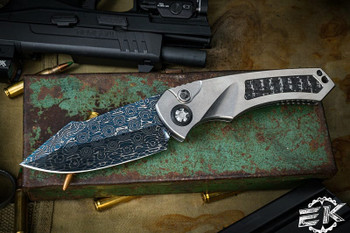How To Spot a Fake Damascus Knife
Posted by EKnives on Feb 22nd 2024
Damascus blades are absolutely stunning, with unique patterns on each and every blade. With such a variety of Damascus blades for sale, you might (rightly) wonder if they are all real. Unfortunately, the knife market does include individuals trying to pass off fake products as genuine, including Damascus blades. This guide will help you spot whether your Damascus blade is real or not.
What is Damascus?
Damascus blades originated in the third century, and back then, knife-makers used a process that we no longer have. The exact process died out around the 17th century. The gist of that method was to melt steel and iron with charcoal in an environment with little oxygen. The ancient blacksmiths would then forge the resulting crystalline material, altering the crystalline structure into the signature waving Damascus pattern.
Now, a modernized method, known as pattern-welded steel, makes the Damascus pattern. In pattern-welded steel, the knife maker folds together two types of steel before doing some acid etching to amplify the differences in the steel.
Finding a Fake
Some blades on the market that sellers advertise as Damascus are actually printed or etched with a pattern on the exterior to give it the appearance of a Damascus blade. Instead of going through the pattern-welding, individuals add patterns to existing blades.
You can use a couple of methods to help you determine whether or not your Damascus blade is legitimate.
1. Check the nooks and crannies.
For a real pattern-welded steel Damascus blade, the waves will be noticeable on each surface of the blade; this includes the flipper tab, spine, and other parts of the blade. The unfinished parts of the knife will still show the waves and evidence of the pattern-welding process. This can be tricky, though. Some legitimate Damascus blades don’t have the waving pattern on the spine or cutting edge of the blade because of the way the folds work out in the pattern-welding process.
2. Look at the pattern.
Real Damascus will have continual patterns. Printed or etched patterns may not line up correctly because of the spine of the knife. If the pattern doesn’t seem cohesive, it could be a sign that the Damascus is a fake.
3. Rub the blade.
Some people adding printed patterns to blades do it cheaply enough that you can rub the offending ink off the blade. However, occasionally, black residue comes off an actual Damascus blade. This residue is from the acid etching process and is not ink, which can be confusing.
4. How do we determine for sure?
If you have gone through the other methods and still aren’t sure about your blade or just want to know for absolute certain, there is one more test you can run on your knife to find out if it is a legitimate pattern-welded steel Damascus blade. This testing takes a few steps:
- Remove the polish. You can do this with sandpaper on the blade. Rub until it has that satin look.
- Apply acid. Once the blade is nice and polished, etch it with muriatic acid or ferric chloride.
If the pattern returns after acid etching the blade, you have a real Damascus. If the pattern is gone after this process, it’s a fake.
Price Point?
You might think that a knife advertised as a Damascus blade that is not very expensive could automatically rule it out as legitimate, but that isn’t always the case either. Conversely, costly knives don’t guarantee legitimacy. Damascus blades can be made relatively inexpensively through the pattern-welding process.
Is a Fake a Problem?
Luckily, finding a fake is actually more rare than you might think. If you do find out you have a fake, it isn’t the end of the world. It should still (hopefully) be a functioning knife.
Do note that the pattern-welding process doesn’t just make knives look cool. It makes them strong. Fake Damascus blades don’t have the same strength that authentic Damascus blades do.
Buying a Damascus Blade
Your best bet for buying real blades is your source. Buy from a reputable supplier and not some random ad off of eBay. You should also be pretty safe sticking to brand names. You should be able to buy Microtech knives or buy Benchmade knives with a Damascus blade without worrying about their authenticity.
Before getting too attached to a design on a Damascus blade while perusing an online knife store, remember that each pattern will be unique. But that is what makes Damascus blades so special.

